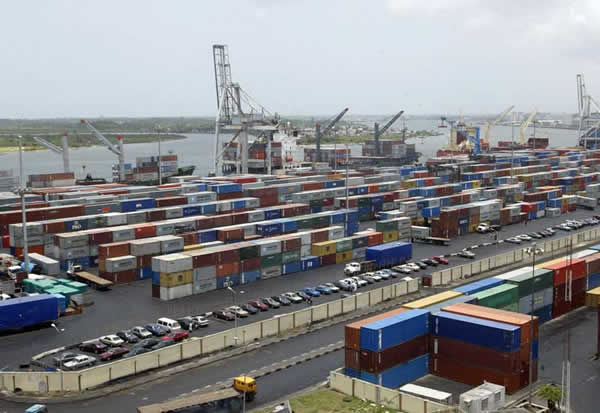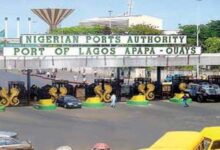Oyetola Declares Nigeria’s Ports Rejuvenated for Business as FG Breaks Two-Decade Gridlock Stranglehold

In a bold declaration that signals a turning point in Nigeria’s maritime logistics narrative, Minister of Marine and Blue Economy, Mr. Adegboyega Oyetola, has announced that the country has “surmounted the systemic challenges that crippled port operations for over two decades.”
Addressing members of Study Group 4 from the National Institute of Policy and Strategic Studies (NIPSS) in Abuja, Oyetola disclosed that Nigeria’s ports—particularly Apapa, once infamous for logistical paralysis—have undergone a silent revolution, emerging as reliable gateways now attracting major global container carriers.
“The fierce, behind-the-scenes battles that led to the clearing of the infamous Apapa gridlock did not come easily,” he stated. “But today, for the first time in 20 years, trucks no longer spend weeks waiting for cargo; haulage costs have dropped by as much as 60%.”
From Dysfunction to Discipline: Breaking the Ports Cartel
What Oyetola described was more than administrative reform—it was a war against entrenched interests. He revealed that years of collusion, corruption, and orchestrated inefficiencies had created a lucrative shadow economy around the ports, particularly in Lagos’ Apapa corridor.
“It was not a natural disaster,” Oyetola said pointedly. “It was engineered by people who built careers and empires on the dysfunction.”
Dismantling this grip meant confronting not just traffic but entire syndicates who weaponised congestion for profit. Oyetola credits the breakthrough to focused leadership and high-level inter-ministerial collaboration, especially in partnership with the ministries of Works, Transportation, and Security agencies.
The New Maritime Order: Lower Costs, Higher Confidence, Greater Revenue
The results, according to data shared by ministry officials, are measurable and transformative:
- Turnaround time for cargo has improved significantly, cutting logistics delays.
- Haulage costs have dropped by up to 60%, benefiting importers and exporters.
- Residential life in Apapa has improved, with cleaner streets, quieter neighbourhoods, and a returning SME ecosystem.
- Major global container lines are rerouting traffic back to Nigerian ports, which had previously lost traffic to Cotonou, Lomé, and Tema due to inefficiencies.
Beyond efficiency, these changes have unlocked new revenue streams for the federal government—positioning the Blue Economy as a critical growth sector.
BRANDECONOMY INSIGHT: Ports as Strategic Assets in Nigeria’s Economic Reset
Oyetola’s statement comes at a time when Nigeria is recalibrating its economic engines to move away from oil dependency. The Blue Economy—encompassing maritime trade, fisheries, coastal tourism, and offshore energy—is now a priority frontier under President Tinubu’s economic diversification agenda.
The port reforms serve as both symbol and substance: a declaration that Nigeria can fix complex, deeply rooted institutional failures, and a sign to domestic and global investors that trade infrastructure can be banked on once more.
But port reform is only the first layer. Experts argue that to sustain the gains, Nigeria must:
- Digitalise port operations end-to-end to eliminate manual bottlenecks.
- Introduce competitive port tariffs and customs reforms to encourage throughput.
- Expand inland dry ports to decongest seaports and streamline national supply chains.
- Accelerate blue economy policies to support shipbuilding, aquaculture, and marine tourism.
NIPSS Commends Progress, Aligns with National Blue Economy Agenda
The Head of Delegation, Mr. Abdulrahman Idris, praised the Minister’s achievements and said the 2025 study tour themed “Blue Economy Sustainable Development in Nigeria: Issues, Challenges and Opportunities” is part of a broader mission to propose strategic policy recommendations to President Tinubu in November.
“Our group comprises senior public and paramilitary executives, and our work will shape high-level decisions for the future of Nigeria’s maritime space,” Idris said.
Conclusion: From Apapa to Africa’s Logistics Hub?
With the port bottlenecks broken, the question now is how far Nigeria can go in repositioning itself as West Africa’s trade and logistics nucleus. If current momentum is sustained, Apapa could be a case study in turning chaos into competitiveness.
But as BRANDECONOMY analysts warn, the ghosts of inefficiency can return—unless the reforms are institutionalised and backed by investment in technology, security, and human capital.
For now, the signal is clear: Nigeria’s ports are no longer waiting zones—they are engines of commerce.











